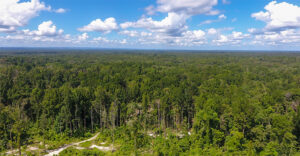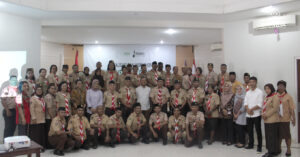
The past few days public staged massive rallies to protest the recently passed Job Creation Law from the Omnibus Draft Bill. The House of Representatives had deliberated the controversial draft bill along this year on the plenary session on 5 October 2020. Many parties observed that the deliberation was in swift process but failed to notice public inputs.
The 905 pages bill is often dubbed the “sapu jagat (one-size-fits-all)” law as there are 11 clusters of policies with 79 multisector laws that need simplifying, trimming, changing and adding to provide job and to ease investment in Indonesia. However, the draft bill sparked polemics as it is deemed giving red carpet to investment and ignoring other aspects.
However, the government responds it differently. Coordinating Minister for Economy Airlangga Hartarto in his official statement said that investment and job provision has so far been hindered by complicated and long process of business license attainment, demanding investment requirements, challenging land provision and even the less optimum capacity development of SMEs and cooperative issues. Worse, administrative and bureaucratic processes for license attainment tend to be sluggish.
“The Job Creation Draft Bill (that had been passed into Job Creation Law) will boost regulation reform and de-bureaucratization so as to create a more efficient, simpler and more certain government service with the implementation of Norm, Standard, Procedure and Criteria (NSPK) and electronic system,” said Airlangga on his official statement as quoted by kompas.com as saying.
The government strongly argued that Job Creation Law is intended to ease business license process so as to expand job creation, promote welfare and alleviate poverty. But, there are some conundrums following the elimination and amendment of articles in that
Read also: Sustainable Fisheries and Maritime Less Prioritized in Job Creation Bill
Environment in Job Creation Law
In addition to the articles on manpower that triggered massive protests, special attention also focuses on ecology and indigenous community in natural resources management issues.
The Job Creation Law passes across three regulations on environment, namely Law No. 32/2009 on Environment Protection and Management, Law No. 18/2018 on Forest Degradation Prevention and Eradication, and Law No. 42/1999 on Forestry.
In the deliberated Job Creation Law, a number of crucial articles in the Law No. 32/2009 was amended and even eliminated. Some of them deals with articles on Environmental Impact Analysis (AMDAL) as the basis for decision making on business activity which is aligned to environmental suitability. Besides, environmental permit is eliminated and amended into business permit with environmental or government approval. The law enforcement stipulating strict liability as mandated by Article 88 of Law No. 32/2009 is amended.
In the Job Creation Law, Article 12 of Law No. 18/2013 on the ban for bringing logging equipment for community without business license is maintained. But, there is an addendum, Article 17A, on a five-year administrative sanction at minimum imposed to anyone that cut trees living surrounding the forest compound.
As to Hariadi Kartodihardjo, a forestry policy professor to IPB’s School of Forestry, on his article “Job Creation Draft Bill Unfair”, the draft bill (that has been deliberated) has weakened the legal basis to seize the large scale and organized illegal actors as mandated by Law No. 18/2013. The draft bill here is not sensitive to indigenous community rights status for property and forests.
The deliberation of Job Creation Law also sparks reaction from many parties. The hashtag #MosiTidakPercaya and Rebuff of Omnibus Law are trending topics on internet. There are at least 8 petitions from change.org to rebuff Job Creation Law. The petition of five religious leaders entitled “Indonesian Religious Leaders Petition: Turn Back Omnibus Law and Open Public Participation” and green activist, Arifsyah M. Nasution, petition entitled “Turn Back Omnibus Law and Distrust Motion to President Jokowi and Parliament” are among the petitions.
“The amendment and elimination of key articles on environmental issues in the Job Creation Law threaten ecology in Tanah Papua. Tanah Papua has the largest natural forests cover in Indonesia and it is getting more vulnerable,” said Bustar Maitar, the CEO of EcoNusa Foundation, responding to the deliberation of Job Creation Law.
Even with the absence Job Creation Law, the nature in Tanah Papua has been degraded due partly to land use change into industrial areas. The indigenous community rights in natural resource management based on local wisdom seems to be intervened, despite the fact that local wisdom is one of the natural protection safeguards. “I worry that the ease of investment provided by the Job Creation Law will serve as justification to investors to clear a more expansive forests in Tanah Papua in such a way that deforestation is uncontrollable in the country. The indigenous community will be more marginalized, and their rights will never get any recognition,” Bustar added.
Government Response
The government responded to public commotion through virtual press conference clarifying the Job Creation Law on 7 October 2020 delivered by 13 ministers and relevant high rank officials. Minister of Environment and Forestry Siti Nurbaya also clarified some issues related to environment criticized by the public.
“It is not correct that there is degradation on environmental protection from the Job Creation Law. There is no change on principle and concept of AMDAL. The change is on the policy and procedure which is more simplified and based on objective,” she asserted.
Concerning with environmental permit, Siti also clarified that it is not correct that the law weakens the regulation on ecological protection because environmental permit is not eliminated but integrated into business licensing. This will strengthen the protection because if there is violation of environment permit, the overall business permit could be litigated. Requirement of business licensing will further be regulated in NSPK within the would-be Government Regulation.
Relating to forestry, Siti said that the forest fire remains the main liability of the business license holder. The Job Creation Law will not only ease business licensing to private sector but also Social Forestry. Meanwhile, dealing with the sanction for forest encroacher is exempted from administrative sanction and resolved through forest area management in case that the violation is committed by individual residing within and or surrounding the forest areas.
Editor & reviewer: Leo Wahyudi







